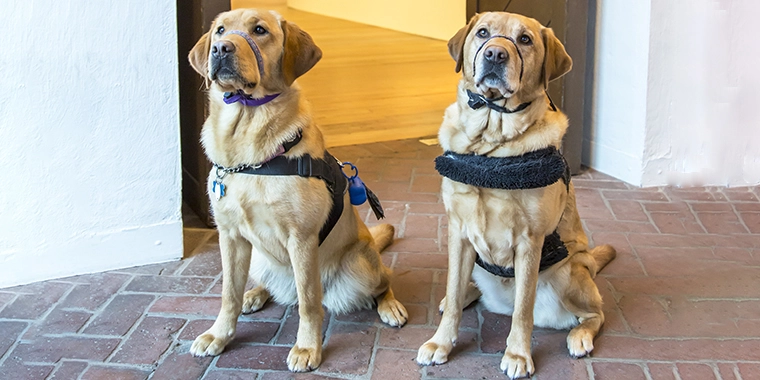
This program is designed for shelter or rescue service dogs of varied ages (8 weeks to 7 months old) and unknown genetics. The dog is typically local to us for testing purposes.
In contrast to most other service dog trainers, we are open to testing a rescue dog for service work potential. Most trainers you talk to don’t even entertain the idea. We can offer this more unique service due to our experience and training skills.
We classify service dogs (tested and approved) and rescue service dogs differently. Genetics and temperament can make or break a service dog’s success. It significantly impacts the completion of the training program. The daily work a service dog faces is intense. A dog that is not mentally sound, will break (aka washout).
Genetics Matters
Getting a rescue service dog means, the breed lines of the dog are unknown. You don’t know the background or genetics. It boils down to luck if the dog can make it through a service dog training program. Even more, if it can work in that capacity afterward. Sarah’s own PTSD service dog came from the shelter and Lola turned out great. But it wasn’t easy because of the behavioral and emotional “baggage” she came with. We don’t mean to discourage you. But we want you to go into the process of training a rescue service dog with open eyes. You must accept that even if your dog tests successfully initially and does well in training, the chances of your rescue service dog “washing out”—the dog failing during training because it can’t handle the tasking or stress—are higher.
With that being said, there are no guarantees of success with a purpose-bred service dog puppy either, should you choose to go through a breeder. You are just increasing your chances of success. In addition, not all breeders are created equal. Do your research and let us help if you want to pursue a purpose-bred Service Dog Puppy instead.
Please also read our article on what kind of dog/breed makes a great service dog.
Picking a Rescue Service Dog
When people select dogs at shelters, they tend to go by what is visually appealing. It is rare for a dog a person tested for service dog fitness, to become their service dog later. For example, the task requirements can include for a rescue service dog puppy to grow into a certain size. If you don’t know the breed of the dog, it is a gamble if your rescue puppy will grow into those task requirements. Also, many shelter dogs have a colorful past. It is imperative to address these issues before any service dog training starts. It’s also important to understand that not all baggage a dog comes with can be resolved.
Increase Your Chances for Success
You can increase your chances of success with a rescue service dog by keeping the following in mind:
- If selecting from a rescue using foster homes, check multiple of their dogs and talk to the fosters. Since the dog is coming from a ‘”home environment”, you will have a better idea of what to expect behaviorally.
- Most shelters represent high volume, chaos, lots of people, lack of play areas, and so on. Given that environment, it is next to impossible to get an accurate idea of, if the dog is good with other dogs, people, and how it will handle change. This can put public safety at risk later if you end up with a psychologically unstable dog and notice it too late. Talk to the shelter, let them know what you are looking for. They may be able to point out more stable dogs, improving your odds for your rescue service dog pick. Keep in mind that most shelter workers don’t know anything about service dogs and will not be of much help.
- If you are determined on adopting a dog from a shelter instead of a rescue, find a service dog trainer to come with you and help pick the best dog for the taskings ahead.
- Once you find a dog in the shelter you like, visit the dog a few times before adopting. Avoid being impulsive with your choice.
Other Rescue Service Dog Considerations
If the rescue dog you choose doesn’t work out in training, it is your obligation to remove the dog from the training program. Be mentally prepared to have a great pet instead of a service dog.
When looking at shelter dogs, take the listed breed with a grain of salt. Sarah’s own rescue service dog’s breed was listed as “Lab mix”. She later tested Lola’s DNA and there is no Labrador in her at all. We personally recommend EmBarkVet.com for canine DNA tests.
Educate yourself on the relevant laws by the Americans with Disabilities Act (ADA) and the Air Carrier Access Act (ACAA), so you understand service dog access rights and possible breed challenges.
Please select your future rescue service dog wisely, as otherwise, it can easily turn into a disaster. We can’t even tell you how many times we have been lunged at by other “service dogs.” If you want to be successful with training a rescue service dog, you have to start the process with open eyes.
